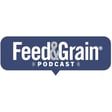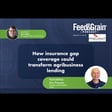
Possible economic impacts of the port strike
In this episode of the Feed & Grain Podcast, host Steven Kilger speaks with Lauren Saidel-Baker, CFA, and economist at ITR Economics, to break down the economic ramifications of the ongoing strike affecting ports along the East and Gulf Coasts. With critical supply chains at stake and uncertainty looming, Lauren offers a nonpartisan, data-driven look at the potential short- and long-term impacts of the strike on the U.S. economy, inflation, and the agricultural industry.
The conversation explores a range of topics, including the strike’s effects on durable and non-durable goods, the pressures it may place on already fragile supply chains, and how businesses might adapt by leveraging alternative shipping routes through Canada and Mexico. Lauren also shares insights into why certain sectors, such as agriculture, might be hit harder than others, and discusses the broader implications for inflation trends as companies face increased costs and potential disruptions.















